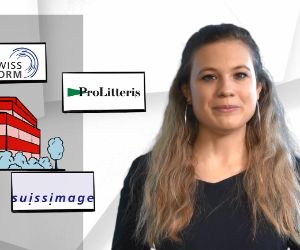Background music
Background music in public spaces
Apply here to license background music
Background music in passenger transport
Apply here to license background music in passenger transport
If you play background music or show television broadcasts such as football matches or TV series, you need a licence under CT 3a.
This applies in particular to the following businesses:
- shops and trades (restaurants, barbers and hairdressers, architects' offices, etc.)
- halls (foyers)
- museums
- hotel rooms, hospitals and holiday rentals
- the carney industry (rides at fairs and fêtes
The licence also covers music on hold played on your phone lines.
If you play background music on your business premises or show broadcasts such as football matches or series, you need a licence under Common Tariff 3a. The same applies to the use of music on hold on your telephone lines.
The licence fee depends on the surface area where the music can be heard or the broadcast viewed.
How are licence fees calculated?
For calculation purposes, all room surfaces are added together: this includes hotel restaurant areas, hallways and lifts where music is played or broadcasts are perceptible. A separate licence under CT HV is required for pay-TV and hotel video services.
Costs
Basic fee: for areas up to 1000m² and/or up to 200 network lines, the basic fee is as follows per calendar month and per place of use (company, shop, bar, etc.):
| Fee | |
| Audio uses | CHF 19.20 |
| Video uses | CHF 20.80 |
Additional fee: in the case of areas larger than 1000 m2 and/or for more than 200 network lines, an additional fee is payable in addition to the basic fee for the excess area, respectively the number of excess network lines, per calendar month and per place of use:
| Additional fee | Total audio | Total video | |
| up to 3000 m2 and/or 600 network lines | CHF 56.66 | CHF 75.86 | CHF 77.46 |
| up to 5000 m2 and/or 1000 network lines | CHF 113.40 | CHF 132.60 | CHF 134.20 |
| over 5000 m2 and/or 1000 network lines | CHF 170.12 | CHF 189.32 | CHF 190.92 |
How to proceed:
Please send us the duly completed online form. The form is available on the customer portal under “Registration”. We will then issue the licence and invoice.
Once your payment is received, we distribute the remuneration to the beneficiary composers, lyricists, and publishers.
FAQ: Frequently asked questions
-
Background music only has an accompanying, supplementary or secondary function. Background music is mainly used in stores, restaurants, waiting rooms, offices, etc. or when phone calls are on hold.
-
There are no exceptions for small shops. As soon as you play background music or films and TV broadcasts on your commercial premises you are liable for fees under CT 3a. In exchange, you have access to the world repertoire of music for a very low price.
-
CT 3a regulates how much you have to pay to play background music on your business premises, for example, or to run films and TV broadcasts on screens there. The fees you pay are distributed to the composers, lyricists or performers of the music, and to the producers, screenplay writers and actors of the films and broadcasts.
In Switzerland, artists, producers and screenplay writers are represented by the five Swiss copyright collecting societies. Since CT 3a is by definition a "common" tariff, you will receive a single invoice, and from SUISA. By paying SUISA's invoice, the claims of all five collecting societies deriving from CT 3a are extinguished.
-
You have to pay fees under CT 3a if at least one of the following circumstances applies:
- you play background music in your restaurant, shop or in any place on your commercial premises;
- you run films, radio or TV broadcasts on your premises;
- you operate a guesthouse, holiday home, patient rooms or the like, and have equipped the rooms with devices to play music or show films and radio and TV broadcasts;
- you play music on your telephone waiting loop.
In a nutshell, since composers, lyricists, performing artists, screenplay writers and producers are by law entitled to remuneration for the use of their works and performances, whenever you use their works and performances you have to pay licence fees.
-
The rates is charged based on the surface area on which the music, broadcast or performance can be heard or seen. The surface areas per location, including any guestrooms, are added together. If a customer operates several locations (business premises, shops, factories, branches, etc.), remuneration is due separately for each location.
The fee for a surface area of 1000 m2 or less is:
- for background music CHF 19.20 per month (plus VAT) and
- for audiovisual works and performances (films, videos and TV broadcasts) CHF 20.80 per month (plus VAT). For larger areas, the fees under point 6 of the Tariff are payable additionally. These flat fees also apply to waiting loops based on the number of telephone lines
For music on hold, the reference basis is the number of lines on the exchange.
Thus for a very low price, CT 3a gives you access to the world repertoire of music.
-
You must contact SUISA of your own initiative; the simplest way to do so is online at www.suisa.ch/3a. If you use music without a licence from SUISA, SUISA can charge double for your unlicensed use. If you have forgotten to declare usage in the past, there will be no consequences as long as you contact us promptly. We will invoice you at the normal CT 3a rate for your prior unlicensed usage.
-
No. There are no exemptions.
Whoever uses music or audiovisual works must pay the fees specified in the tariff because the rightholders are by law entitled to remuneration.
-
No. If the holiday home or guestroom is rented and equipped with the necessary devices, the lessor/landlord must pay licence fees in accordance with CT 3a.
-
No. There are different tariffs for live music. Just as there are many possible uses of music, there are several different tariffs for the individual uses.
-
When you buy a CD, you acquire the right to play it in your private sphere, i.e. at home or in your car. Use outside the private sphere is not included in the price of the CD. To play the CD elsewhere, you have to pay a licence fee under CT 3a.
-
Unless otherwise stipulated in the licence, SUISA basically waives the need for programme listings.
-
SUISA invoices CT 3a fees once a year. As a rule, the licence is granted for a full calendar year (1.1. to 31.12) and corresponds to twelve times the monthly fee. For businesses or holiday homes that do not play background music or films all year round, the fee is only charged for the relevant number of months.
Unless you communicate any changes to SUISA, you will be invoiced on the same basis the following year. For one-off uses (e.g. fairground stands or sports events limited in time), individual invoices will be issued for the relevant time frame; fractions of a month count as a full month. In any event, the minimum charge is equal to one month's fee.
-
Call SUISA's infoline to communicate the changes (0844 234 234). If you have not paid your invoice yet, we will cancel it and issue a new one. If you have already paid the invoice, we will refund the difference or carry it forward to the next invoice.
-
The fees specified by the Radio and Television Act (RTVA) serve to secure independent radio and TV broadcasting in Switzerland. The Federal Office of Communications (OFCOM) distributes the proceeds to the SRG and to the other radio and TV broadcasters with a performance mandate which use them to finance their broadcasting activities.
The licence fees collected by SUISA are owed to the composers, lyricists and performers of the music and to the producers, screenwriters and actors of the films and broadcasts. All the latter are entitled to remuneration whenever their works and performances are used outside the private sphere, e.g. as background music in stores, restaurants, lounges, working areas or as music for telephone loops.
-
No, CT 3a licence fees are payable irrespective of the radio and TV reception fee. Even if a business does not have to pay the radio and TV reception fee - e.g. because its annual sales are less than CHF 500,000 - licence fees are due under CT 3a for music, films or TV broadcasts played outside the private sphere.


